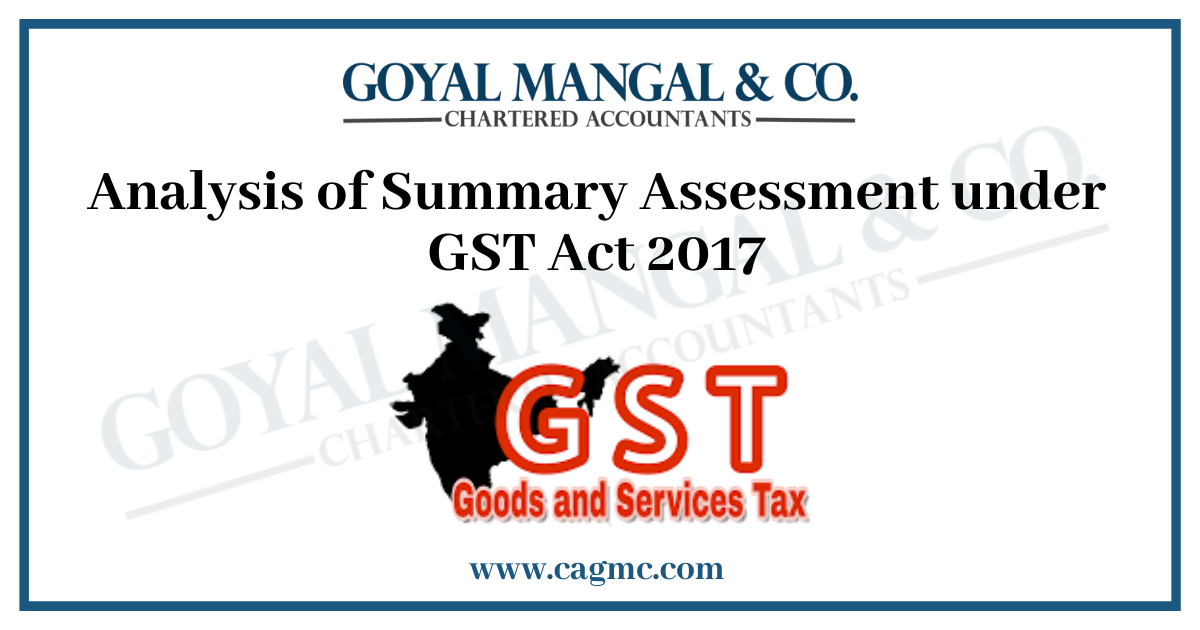
The Goods and Services Tax (GST) Act, 2017, is a comprehensive tax system that has replaced several indirect taxes in India. Under this system, taxpayers are required to submit regular returns and comply with various provisions of the law. One important aspect of GST compliance is Summary Assessment, which involves determining the tax liability based on a summary of the taxpayer’s tax returns.
This article briefly describes the Summary Assessment under GST Act 2017, Requirement to invoke provisions of Summary Assessment.
|
Table of Content |
What is Summary Assessment?
The Summary Assessment has the nature of a protective assessment. This is a procedure that determines the tax liability quickly and efficiently. Section 64 of the GST Act, 2017 deals with summary assessment in certain special cases for the purpose of protecting an interest in revenue. In exceptional circumstances, it gives special powers to the regular officer to assess the tax without notice or an opportunity to be heard. Aggregate assessment under the GST is a provision that allows tax authorities to assess a taxpayer’s tax liability on an aggregate basis. returns submitted by the taxpayer. A Summary Assessment is carried out by a GST officer, who reviews the summary of the return and determines the tax liability based on the information provided by the taxpayer. This article discusses the provisions of the summary assessment.
Scope of Summary Assessment
Section 64 of GST Act, 2017 empowers an officer to make a Summary Assessment to protect an interest in income if the officer has evidence that a person has become liable to pay tax and has reasonable cause to believe that delay in making the order will adversely affect the interest in income. In such cases, the proceedings must be initiated with the prior permission of the Additional Commissioner or Joint Commissioner concerned. It follows from the proviso that the provisions on aggregate measurement apply only to the delivery of goods. A summary assessment was carried out for the purpose of immediate tax recovery from any tax defaulter. It does not supersede any order made under other provisions of law.
Requirement to invoke provisions of Summary Assessment
All taxable persons are not subject to tax according to Section 64 of the GST Act, 2017. In the event that, in the course of any proceedings under the Act, the competent officer finds that unaccounted for goods are lying in the warehouse or vehicle and the taxable person concerned is unable to account for such goods or produce documents detailing the goods and is of the opinion that such goods are tax due, the competent officer may proceed with the assessment of tax according to Section 64 of the Act. However, before initiating such proceedings, there must be proof of tax liability, and the authority should have sufficient reason to believe that the delay in assessment may adversely affect interest on the income.
Process of Summary Assessment
Following are the process of Summary Assessment:
- The Summary Assessment process begins with the issuing of a summons to the taxpayer, in which he is required to submit a summary return. The taxpayer must submit the summary of the tax return within the specified period; otherwise, the tax administrator can proceed with the assessment based on the available information.
- The financial officer will review the overview of the return and, based on the data provided, determine the taxpayer’s tax liability. If the tax administrator discovers an irregularity or error in the return summary, he can issue a disclosure notice to the taxpayer, asking him to explain the irregularity or error.
- The taxpayer must respond to the notice of production within the specified time and provide a detailed explanation of the discrepancies or errors. The tax officer may also conduct a personal hearing with the taxpayer to discuss the issues raised in the show-cause notice.
- Based on the taxpayer’s data, the tax administrator can make the necessary adjustments to the tax liability and issue an assessment. The assessment order specifies the taxpayer’s tax liability, along with any interest, penalties, or other applicable charges.
- If the taxpayer does not agree with the assessment order, he can appeal to the appeal authority within the specified period. The Appellate Body will review the appeal and may either confirm, modify, or set aside the assessment order.
Withdrawal of Summary Assessment order
The Summary Assessment order is subject to correction and review. Section 64(2) of the GST Act, 2017 provides for the withdrawal of an erroneous summary assessment order. A taxable person against whom a summary assessment order has been issued may apply (using Form GST-ASMT-17) for revocation of the said order to the concerned Additional Commissioner or Joint Commissioner within thirty days of receipt of the order. After considering the reasons, if the said officer finds that the order is erroneous, he may withdraw the order and refer it to the proper officer to determine the tax liability under the provisions of Sections 73 or 74 of the Act. If such a request of the taxable person is not granted, he can appeal against the said order u/s 107 of the Act. The concerned Additional Commissioner or Joint Commissioner may, on his own initiative, take similar action if he finds that the summary assessment order is erroneous.
Summary Assessment in certain special cases
Analysis – In the GST Act, “Summary Assessment” refers to assessments that are made ex-parte and preferentially where there is reason to believe that there will be a loss of tax revenue if such an assessment is delayed.
- The proper officer must have evidence that there may be a tax liability.
- The proper officer has obtained the prior permission of the Additional or Joint Commissioner for a summary assessment of tax liability. The proper officer must have sufficient reason to believe that any delay in passing the assessment order would result in a loss of revenue.
- A summary tax assessment is required if there are reasonable grounds to believe that the taxable person will not pay any tax, penalty, or interest unless the assessment is completed immediately.
- The section enables a person who is assessed and is served with an order so passed to come forward and make an application under rule 100(4) in FORM GST ASMT-17 to the Additional or Joint Commissioner, who will consider the same. and if the Additional or Joint Commissioner is satisfied, the summary assessment order may be set aside.
- Further, the Additional/Joint Commissioner may, on his own initiative, withdraw such order and proceed as per the procedure laid down in Section 73 or Section 74, as the case may be, for determining taxes unpaid, short-paid, or wrongly refunded, or if the input tax credit has been unduly availed of, if he considers that such an order is erroneous.
- On receipt of the application, the concerned officer has to issue an order withdrawing or rejecting the application in accordance with Rule 100(5) in FORM GST ASMT-18.
Conclusion
Assessment under any law is very important to ensure that there is no leakage to the government’s tax revenue. However, certain assessment provisions contained in the GST Act give the Assessing Officer discretionary powers to issue notices, calculate tax liability and issue assessment orders. These provisions should be used within the spirit of the law to regulate taxpayers and should not become a way of harassing honest taxpayers leading to unwarranted litigation at appellate levels, including courts.


